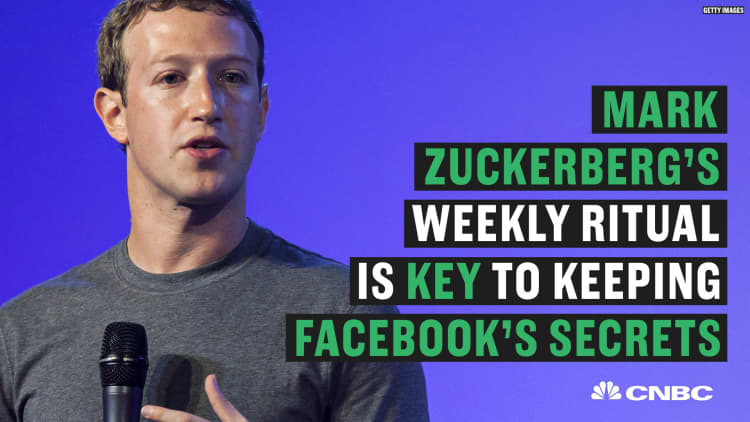At Wednesday's Senate Intelligence Committee hearing on Capital Hill, Facebook's chief executive, Mark Zuckerberg, was notably absent. In his place was COO Sheryl Sandberg.
The move was a savvy one, experts say, and reflects that the company knows its CEO's strengths and weaknesses.
In April, the Facebook chief executive faced hours of interrogation from lawmakers, prompted by data breaches, reports of "fake news" and Russian interference during the 2016 election.
Although senators were chastised for their lack of understanding about the social media platform, Zuckerberg didn't fare much better. Many said he appeared stiff, awkward and unable to clearly articulate Facebook's next steps.
"Zuckerberg's testimony last time came across as hard hard to access," says Anthony Johndrow, CEO of reputation advisory firm Reputation Economy Advisors. "He skirted the issue of what they were actually doing to tackle the data breach and he didn't come across as transparent."
Sensing this growing concern over Facebook's perceived lack of transparency and likely anticipating harder-hitting questions, the social media giant employed a more tactical approach for Wednesday's Senate testimony. This time around, the company sent Sandberg, a visible leader at the company, in lieu of the CEO.

At Facebook, both execs portray their roles as being complementary to one another. While Sandberg primarily oversees the company's business strategy, Zuckerberg deals more with the tech side, experts say. This division of work also mirrors their strengths. "[Zuckerberg] is considered a genius," says Johndrow, "and sometimes geniuses don't convey very well."
But where experts say Zuckerberg falters, Sandberg delivers. Compared to Zuckerberg, who some experts say was hard to relate to and difficult to understand last spring, Sandberg is media-trained, well-spoken, seems approachable and has a large following through her books and speaking events.
"[Zuckerberg is] clearly not a gifted or natural communicator in that setting, as we saw in the previous hearing," says Paul Argenti, a professor of corporate communication at Dartmouth College's Tuck School of Business. The COO, on the other hand, has a "fluency with language" and is a "natural orator."
"Sandberg can probably warm up the audience and be better able to address the political climate," Argenti adds.
The fact that Sandberg is a highly visible woman in a field comprised mostly of men also works in her favor. Congress might be more sensitive to how they approach questions and interact with her, says Richard Levick, CEO of a self-named communications firm.
As the No. 2 person at Facebook, Sandberg also has the authority and credibility to speak before Congress and her ability to provide clarity makes her fit for this task.
Although Sandberg represented the company at today's hearing, Zuckerberg hardly faded into the background. In a bid to appear more transparent, the CEO laid out the company's position in a Washington Post op-ed Wednesday — and it worked. "The timing was perfect and it showed that he's a part of the solution even though he's not physically there sitting on a bench," says Levick.
When deciding who should speak on a company's behalf during periods of uncertainty, the CEO may not always be the company's best bet. "We see with our eyes," says Levick, so effective communication, both verbally and through body language, is key. Leaders must ask themselves: Does this person look trustworthy? Will this person help us avoid legal trouble? Do they know the issue in and out? Can they make enough promises without committing to too many?
Once those questions are answered, prepare the talking points, not only with lawyers, but with your communications department. "You must think of how this will play out to a wider audience," says Levick. "That's hugely important."
Like this story? Subscribe to CNBC Make It on YouTube!
Don't miss: What Elon Musk could learn about delegation from Jeff Bezos and Warren Buffett



